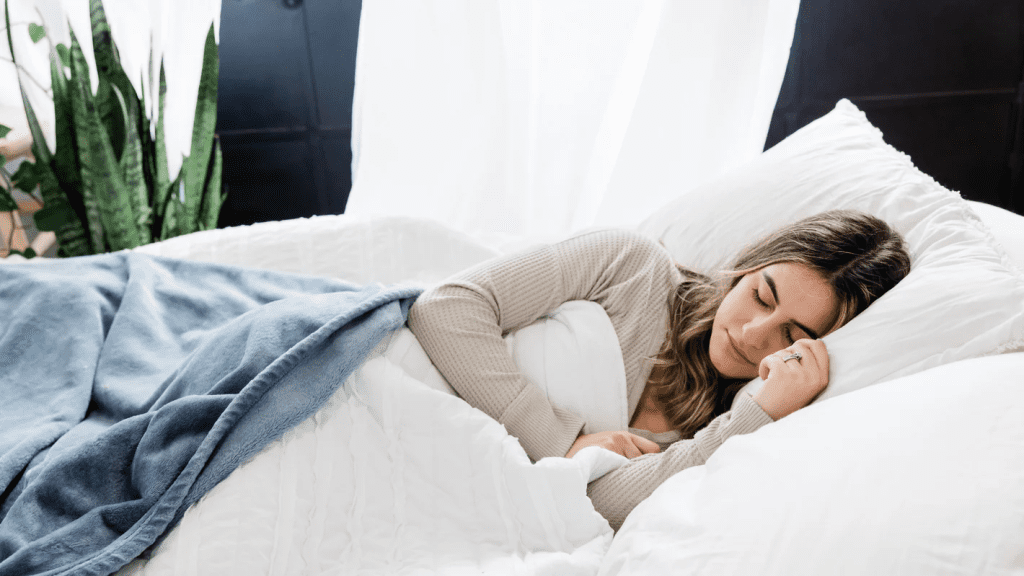Getting enough sleep is one of the most important pillars of good health. When your sleep quality improves, you notice immediate benefits like better focus, mood stability, and overall well-being. On the flip side, a lack of sleep can increase the risk of health issues like obesity, heart disease, high blood pressure, and diabetes. While modern life can make it hard to get the rest you need, there are natural and effective ways to boost sleep quality without turning to medications. Here are seven natural strategies to help you get a better night’s rest.
1. Establish a Consistent Sleep Schedule

One of the most effective ways to improve sleep quality is to maintain a consistent sleep schedule. Your body operates on an internal clock, known as the circadian rhythm, which regulates sleep-wake cycles. When you go to bed and wake up at the same time every day, your body adapts, making it easier to fall asleep and wake up feeling refreshed.
- Tip: Aim to stick to your schedule even on weekends. Sleeping in may seem like a luxury, but it can throw off your body’s rhythm and make it harder to fall asleep during the week.
2. Create a Restful Sleep Environment
Your bedroom should be a sanctuary designed specifically for rest. Factors like temperature, noise, and light can drastically affect sleep quality, so it’s essential to create an environment that fosters relaxation. Keep the room cool, ideally between 60-67°F (15-19°C), as cooler temperatures signal to your body that it’s time to sleep.
- Control Light and Sound: Consider using blackout curtains or eye masks to eliminate light exposure. If noise is an issue, earplugs or white noise machines can help drown out disturbances.
- Invest in Comfort: A quality mattress and pillows suited to your sleeping style can make a world of difference. A comfortable sleeping surface ensures that you don’t wake up feeling stiff or sore, which can disrupt sleep.
3. Watch What You Eat and Drink
What you consume throughout the day has a direct impact on how well you sleep at night. To improve sleep quality, be mindful of your diet, particularly in the hours leading up to bedtime.
- Avoid Heavy Meals: Eating large or rich meals late in the evening can cause indigestion and discomfort, making it harder to fall asleep. Try to finish eating at least 2-3 hours before bed.
- Limit Caffeine and Nicotine: Both of these stimulants can keep you awake long after you’ve consumed them. If you’re sensitive to caffeine, avoid coffee, tea, chocolate, and sodas in the afternoon and evening.
- Be Cautious with Alcohol: While alcohol might make you feel drowsy, it disrupts your sleep cycle, reducing the quality of sleep and causing you to wake up during the night.
4. Get Regular Physical Activity
Exercise is one of the best natural ways to enhance sleep quality. Engaging in regular physical activity can help you fall asleep faster and enjoy deeper, more restorative sleep. However, it’s essential to time your workouts properly.
- Best Time to Exercise: Aim to finish your workout at least a few hours before bedtime. Exercising too close to sleep can be stimulating, raising your heart rate and body temperature, which makes it harder to wind down.
- Even Light Exercise Helps: If vigorous exercise isn’t for you, even light activities like walking or yoga can positively impact sleep quality.
5. Manage Stress and Anxiety

Stress is one of the most common culprits behind poor sleep. Whether it’s work stress, financial worries, or personal problems, an anxious mind has trouble settling down for rest. To combat this, consider incorporating relaxation techniques into your daily routine.
- Deep Breathing and Meditation: Practicing mindfulness meditation or deep breathing exercises before bed can calm your mind and help reduce the tension that keeps you awake.
- Unwind with a Journal or Book: Writing down your thoughts or reading a relaxing book before bed can help ease your mind and make it easier to drift off to sleep.
6. Limit Daytime Naps
While a short nap can be a great way to recharge, napping for too long or too late in the day can interfere with your nighttime sleep. If you’re someone who struggles to fall asleep at night, keeping naps short and early in the day might be beneficial.
- Keep Naps Short: Limit naps to 15-30 minutes to avoid feeling groggy or disrupting your nighttime sleep.
- Nap Early: Try to nap earlier in the afternoon, ideally before 3 p.m., to ensure it doesn’t interfere with your ability to fall asleep at night.
7. Consider Natural Sleep Aids

There are several natural supplements and herbs known for their sleep-promoting properties. Before turning to prescription sleep aids, you might want to try some of these natural remedies:
- Melatonin: This hormone regulates your sleep-wake cycle. A melatonin supplement can help when your sleep schedule is off, such as when dealing with jet lag.
- Valerian Root: Known for its calming effects, valerian root is often used to reduce anxiety and promote better sleep.
- Chamomile and Lavender: These herbs are popular for their calming properties and are commonly consumed in teas to induce relaxation.
As always, consult with a healthcare provider before starting any supplement regime, especially if you’re taking other medications or have pre-existing health conditions.
Conclusion: Sleep Better, Naturally
Improving sleep quality doesn’t always require medications or drastic measures. By incorporating these seven natural strategies into your routine, you can enhance your sleep naturally. A consistent sleep schedule, a relaxing bedroom environment, mindful eating, regular physical activity, stress management, controlled napping, and natural sleep aids can all contribute to a restful and restorative night. The key is consistency—start implementing these changes today, and your body and mind will thank you with better, deeper sleep.
In a world where sleep often gets pushed aside, these natural methods are a gentle reminder that rest is essential for a healthier, more energized life.


